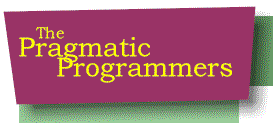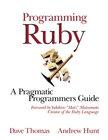
| Programming Ruby | |
Object-Oriented Regular Expressions |
Start using Ruby's regular expressions, and you'll soon come across a whole menagerie of weird-looking variables,
$&,
$1, $' and others. We have to admit that while
all these weird variables are very convenient to use, they aren't very
object oriented, and they're certainly cryptic. And don't we say that
everything in Ruby is an object? What's gone wrong here?
Nothing, really. It's just that when Matz designed Ruby, he
produced a fully object-oriented regular expression handling system. He
then made it look familiar to Perl programmers by wrapping all these
$-variables on top of it all. The objects and classes are still there,
underneath the surface. So let's spend a while digging them out.
We're all familar with one class: regular expression literals
create instances of class Regexp
.
re = /cat/
re.type # -> Regexp
The method Regexp#match
nil. On success, it returns
an instance of class MatchData
. And that MatchData object gives you access to all
available information about the match. All that good stuff that you can
get from the $-variables is bundled in a handy little object.
re = /(\d+):(\d+)/ # match a time hh:mm
md = re.match("Time: 12:34am")
md.type # -> MatchData
md[0] # == $& # -> "12:34"
md[1] # == $1 # -> "12"
md[2] # == $2 # -> "34"
md.pre_match # == $` # -> "Time: "
md.post_match # == $' # -> "am"
Because the match data is stored in it's own object, you can keep
the results of two or more pattern matches available at the same time,
something you can't do using the $-variables. In the next example, we're
matching the same Regexp object against two strings. Each
match returns a unique MatchData object, which we verify by
examining the two subpattern fields.
re = /(\d+):(\d+)/ # match a time hh:mm
md1 = re.match("Time: 12:34am")
md2 = re.match("Time: 10:30pm")
md1[1,2] # -> ["12", "34"]
md2[1,2] # -> ["10", "30"]
So how do the $-variables fit in? Well, after every pattern match,
Ruby stores a reference to the result (either nil or a
MatchData object) in a thread-local variable (accessible
using $~). All the other regular expression variables are
then derived from this object. Although we can't really think of a use for
the following code, it demonstrates that all the other regexp-related
$-variables are indeed slaved off the value in $~.
re = /(\d+):(\d+)/
md1 = re.match("Time: 12:34am")
md2 = re.match("Time: 10:30pm")
[ $1, $2 ] # last successful match # -> ["10", "30"]
$~ = md1
[ $1, $2 ] # previous successful match # -> ["12", "34"]
Having said all this, we have to 'fess up. Andy and Dave normally
use the $-variables rather than worrying about MatchData
objects. For everyday use, they just end up being more convenient.
Sometimes we just can't help being pragmatic ;-)
Copyright (c) 2001, The Pragmatic Programmers
![]()
| Home PragProg Ruby Contact us |
The Pragmatic Programmers, LLC
All Rights Reserved
